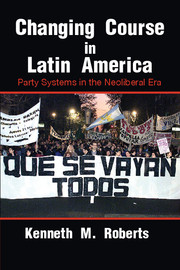Book contents
- Frontmatter
- Dedication
- Epigraph
- Contents
- List of Figures
- List of Tables
- Preface and Acknowledgments
- List of Abbreviations
- 1 Introduction: Party System Change in the Neoliberal Era
- Part I Explaining Regional Patterns
- Part II National Experiencesin Comparative Perspective
- Appendix Election Results in Latin America
- References
- Index
1 - Introduction: Party System Change in the Neoliberal Era
Published online by Cambridge University Press: 18 December 2014
- Frontmatter
- Dedication
- Epigraph
- Contents
- List of Figures
- List of Tables
- Preface and Acknowledgments
- List of Abbreviations
- 1 Introduction: Party System Change in the Neoliberal Era
- Part I Explaining Regional Patterns
- Part II National Experiencesin Comparative Perspective
- Appendix Election Results in Latin America
- References
- Index
Summary
A political earthquake struck Venezuela when Hugo Chávez was elected president in December 1998. Chávez, a former lieutenant colonel in the Venezuelan army, launched his political career in 1992 by leading a bloody military revolt against a democratic regime that had long been considered among the most stable in Latin America. The coup attempt failed, landing Chávez in prison, but it catapulted the former paratrooper instructor into the public imagination as a symbol of rebellion against the political establishment and its mismanagement of the country’s oil wealth. Following a presidential pardon, Chávez founded a new political movement and launched a populist campaign for the presidency in frontal opposition to traditional parties and the free-market reforms they had supported for most of the past decade. Although Venezuela boasted one of the strongest and most highly institutionalized party systems in Latin America (Coppedge 1994; Mainwaring and Scully 1995: 17), the two dominant parties ultimately withdrew their own presidential candidates and threw their support to a less threatening independent figure in a desperate gambit to defeat Chávez’s “outsider” campaign. Nevertheless, Chávez won a landslide victory that not only signaled the eclipse of traditional parties, but a collapse of the collusive, patronage-ridden political order they had anchored since the founding of the democratic regime forty years before. Within a year, Chávez had bypassed congress and convoked a series of popular referendums to elect a constituent assembly, rewrite and ratify a new constitution, and refound regime institutions. For Venezuela, a new political era had dawned.
Several years later, neighboring Brazil also elected a new leftist president, former union leader Luiz Inácio “Lula” da Silva of the Workers’ Party (PT). Like Chávez, Lula had a track record of opposition to the “neoliberal” market reforms that swept across Latin America in the waning decades of the 20th century, although he had moderated his stance considerably by the time he captured the presidency in 2002 (on his fourth bid for the office). Unlike Chávez, Lula represented a party that had become a pillar of Brazil’s political establishment, despite its origins in a militant labor movement that spearheaded popular protests against Brazil’s military dictatorship in the late 1970s (Keck 1992; Hunter 2010).
- Type
- Chapter
- Information
- Changing Course in Latin AmericaParty Systems in the Neoliberal Era, pp. 1 - 16Publisher: Cambridge University PressPrint publication year: 2015



